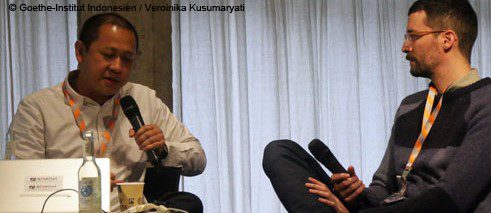Film
Traversing the Archive

During its heyday, the Indonesian State Film Production Center (Produksi Film Negara or PFN) produced at least 4,860,000 feet of celluloid of completed films per year. Until 1985, PFN’s collection at the Indonesian National Archive reached about 21,809,200 feet (24,523 reels) of 16mm and 35mm films. Thirty years afterwards, there are 55,000 films in celluloid in the Indonesian National Archive but only 11,000 titles can be publicly accessed.
During its heyday, the Indonesian State Film Production Center (Produksi Film Negara or PFN) produced at least 4,860,000 feet of celluloid of completed films per year. Until 1985, PFN’s collection at the Indonesian National Archive reached about 21,809,200 feet (24,523 reels) of 16mm and 35mm films. Thirty years afterwards, there are 55,000 films in celluloid in the Indonesian National Archive but only 11,000 titles can be publicly accessed.
Presenting Lab Laba-Laba’s works at the “Visionary Archive” program at the Forum Expanded section at the Berlinale, Edwin screened several found footages from the vault of PFN including animated film si Titik and documentary footage Irian Jaya to enthusiastic audiences. Beside Edwin, “Visionary Archive” also invited other six initiatives and artists who work with archive, ranging from the work of Lagos Film Society to scholar Eyal Weizman. Different encounters and experiences with a variety of audiovisual archives become the central subject matter of the section.
The State Film Production Center and Archive of Authoritarianism
Edwin’s presentation itself focuses on PFN, an Indonesian state owned-enterprise founded in 1945, the year of Indonesian independence. Although having a long predecessor in the colonial period, PFN’s reputation is founded on its role as one of the most important propaganda institutions during the authoritarian period of the New Order.In the 1980s, PFN produced a number of “struggle” films aiming specifically for youth market, including Pengkhianatan G 30 S PKI (The Treason of G 30 S/Indonesian Communist Party), the most important film for the regime. In 1988, PFN began to develop its capacity to process and edit celluloid for commercial purposes on top of its state-sanctioned film production. By the end of that decade, PFN became the largest film laboratory in Southeast Asia.
On top of bringing many PFN’s films to light, Lab Laba-Laba works with the celluloid materials to restore and re-screen it to digital native audiences. They make use of PFN’s equipment that had been left abandoned for twelve years. By so doing, Lab Laba-Laba makes accessible films that are prohibited or simply lost in a dark, gloomy, and humid film laboratory and studio complex of the Indonesian State Film Production Center.